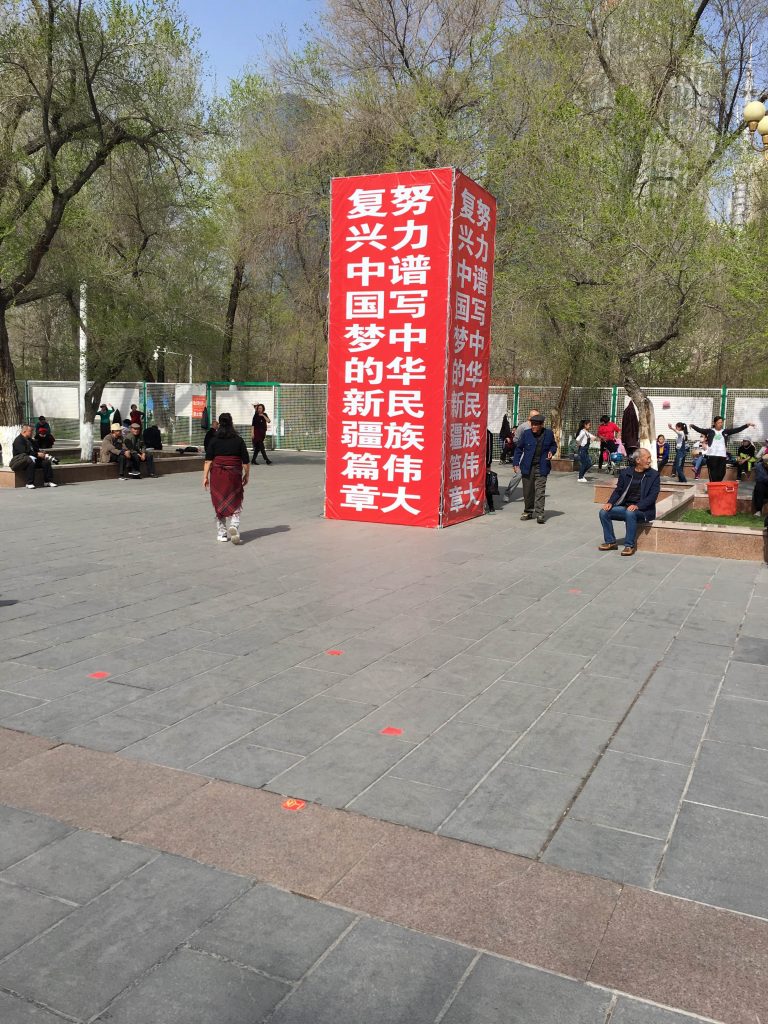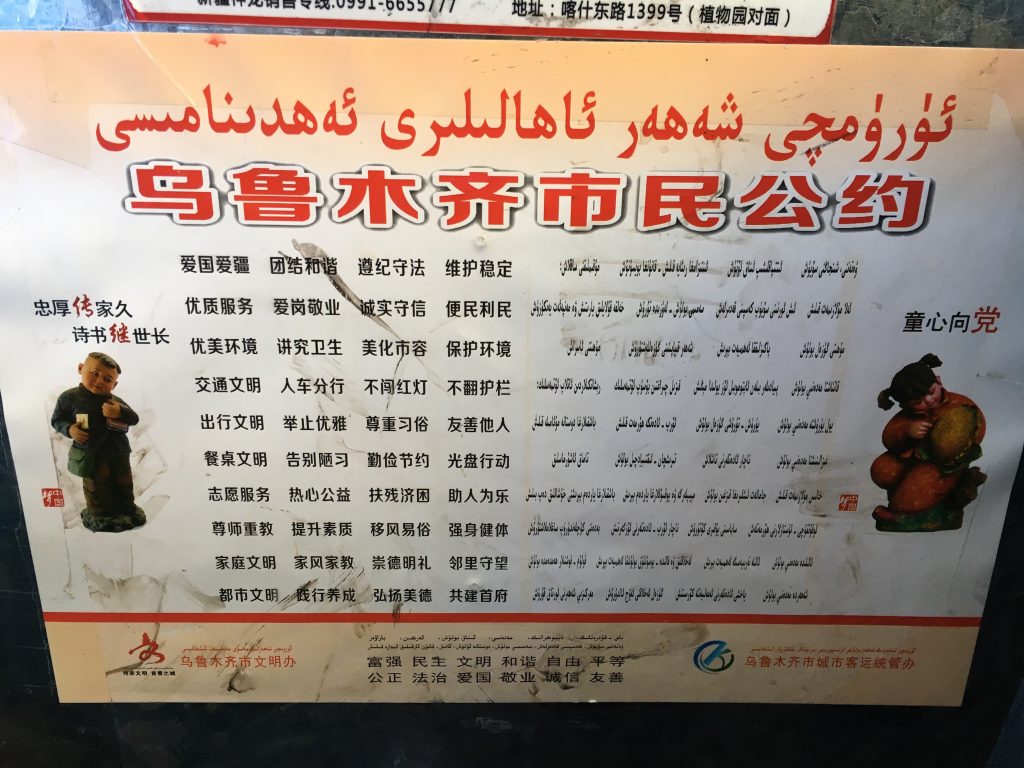An ongoing terror crackdown in Xinjiang, launched in May 2014 in response to escalating violence and subsequently extended, has mostly targeted the region’s Uyghur ethnic minority. Rights advocates and overseas Uyghur exile groups have blamed the increasingly harsh and apparently indefinite campaign for exacerbating ethnic tensions and further destabilizing the region. The crackdown has included religious fasting bans, local and region-wide rules against “extremist behavior” including wearing veils or beards, a ban on “extreme” Islamic baby names, a biometric data collection system, and the use of political re-education camps—whose existence authorities continue to deny despite a mounting collection of evidence. Dr. Adrian Zenz, who described the camps in detail in a recent report, recently spoke further with RSDL Monitor about the indoctrination techniques used and the general conditions inside.
State propaganda has long been prolifically used in Xinjiang, but appears to have proliferated still further amid the ongoing crackdown. Meanwhile, China has increased its efforts to pressure Uyghur journalists and government critics living abroad through intimidation and targeting of their Xinjiang-based family members. CDT contributor Alicia, who earlier this year translated an “ethnic harmony”-focused propaganda anthem that she heard countless times while in Urumqi, has translated several recent propaganda posters that she saw on a recent trip to the city:

“Don’t Forget the Original Aspiration, Keep in Mind the Mission; the Unremitting Struggle to Realize the Chinese People’s Great Rejuvenation of the Chinese Dream“

“Strive to Compose the Story of the Chinese People’s Great Rejuvenation of the Chinese Dream”

“Cleave to the Overall Goals of Societal Stability and Long-term Peace and Order”

“Build a Beautiful Xinjiang; Work Together to Make the Fond Dream of the Homeland Plausible”
The final sign submitted by Alicia was seen in the back of a taxi. It has been translated line for line in the blockquote following the image:
Urumqi City Citizens’ Joint Pledge
Left illustration: Honesty and tolerance passed from generation to generation for a long time
Right illustration: Focus on the Chinese Communist Party
Line 1: Love of country, and love of Xinjiang; Harmonious unity; Observe discipline and abide by the law; Maintain stability
Line 2: High quality service; Industrious and conscientious in work; Honesty and keeping one’s word; For the convenience and benefit of the people
Line 3: Exquisite environment; Strive for excellent sanitation; Beautify the appearance of the city; Protect the environment
Line 4: Interconnected civilization; Pedestrians and vehicles separated and orderly; Don’t run red lights; Don’t climb over guardrails
Line 5: On the long journey of civilization; Elegant bearing; Respect tradition; Friendly to others
Line 6: Civilized dinner table; Farewell to corrupt practices and bad habits; Diligent and thrifty; Clean your plate [don’t waste food]
Line 7: Volunteer service; The spirit of public service; Help the disabled and aid the weary; Take pleasure in helping others
Line 8: Respect teachers and attach importance to teaching; Promote character and inner quality; Change prevailing habits and customs; Keep fit and work out
Line 9: Civilized family; Upbringing with family traditions; Sublime morals and righteous etiquette; Keep watch over your neighborhood
Line 10: Civilized City; Practice and develop; Promote virtue; Cooperation in the autonomous region capital
Bottom left: Impart and inherit civilization; A virtuous capital city; Urumqi Civilization Office
Bottom middle: Rich and powerful, democracy, civilization, harmony, freedom, equality; Just and fair, rule of law, patriotic, dedicated to work, honest, friendly
Bottom right: Urumqi Transportation
For more examples of current propaganda and ideological rhetoric, see CDT’s recent translations of promotional material at Buddhist temples which use Party language and insignia, or of the Beijing Planning Office of Philosophy and Social Science’s suggestions for Xi Jinping Thought-related research topics.
On Sunday, meanwhile, Buzzfeed’s Megha Rajagopalan, who has previously reported on Xinjiang’s role as a “frontline laboratory for surveillance,” tweeted two other travelers’ impressions from the region:
2 American friends were traveling in Xinjiang this month and asked me to share some photos and observations in a thread. They came away shocked at the level of militarization. As tourists they moved around freely in a way that's become tougher for journalists to do.
— Megha Rajagopalan (@meghara) June 25, 2018
About them — they lived in Beijing for many years, speak Chinese perfectly & know the country well. They are both white (can't pass as either Han or Uighur). Neither works on human rights, foreign policy or anything "sensitive." Asked not to be named because of visa concerns.
— Megha Rajagopalan (@meghara) June 25, 2018
In Kashgar on a weekend, they saw a military parade on Jiefang Lu, a major street. "All traffic on the street was blocked off by a line of city buses as what must have been at least five hundred police, military police and soldiers marched down the main road in formation…"
— Megha Rajagopalan (@meghara) June 25, 2018
… interspersed with police vans and with an armored personnel carrier bringing up the rear. I was able to snap a few seconds of video before a cop saw us filming and waved us away." pic.twitter.com/EVyfzscGAo
— Megha Rajagopalan (@meghara) June 25, 2018
"Walking around Kashgar you can’t go two blocks without running into police," my friend added. Every entrance to a public place has a police checkpoint, where police individually check the ID card of every Uyghur walking by and record down their name and information by hand."
— Megha Rajagopalan (@meghara) June 25, 2018
Here's a security checkpoint before getting into a marketplace where handicrafts, snacks and other goods are sold. pic.twitter.com/u5iGe15hkK
— Megha Rajagopalan (@meghara) June 25, 2018
Here's one outside an elementary school. pic.twitter.com/IGMVU5JJTq
— Megha Rajagopalan (@meghara) June 25, 2018
"We also ran into frequent patrols of uyghur civilians wearing armbands designating them as “security volunteers” (安全员)walking around the city carrying simple blunt weapons — usually either a crude wooden bats or a length of metal pipe," my friend said. pic.twitter.com/NRmZngPDXp
— Megha Rajagopalan (@meghara) June 25, 2018
They tried to visit the Id Kah Mosque in the city's center but found it empty during Friday prayers. "It seemed as if the mosque was maintaining the pretense of conducting prayers but that locals had been discouraged (or banned) from actually attending prayers there."
— Megha Rajagopalan (@meghara) June 25, 2018
"Every time we took a cab we were stopped at a police checkpoint & had our passports checked. Same for every time we took a train," my friend adds. BUT — "Was obvious that the police had been ordered to stop & check foreigners but that they didn’t actually have clear orders…"
— Megha Rajagopalan (@meghara) June 25, 2018
"…on what to do with us." When traveling in Xinjiang, "every 'check' was different. Sometimes they just wrote down our passport information by hand, sometimes they had a phone app to enter in our information, sometimes the cop just took a photo of the passport."
— Megha Rajagopalan (@meghara) June 25, 2018
"During one check, we were pulled into a police station where two cops at a desk questioned us, then called a superior on the phone who proceeded to ask me the same set of questions by phone," says my friend. Eventually the officers manually wrote down their passport info.
— Megha Rajagopalan (@meghara) June 25, 2018
I include this anecdote because it shows how despite all the modern/expensive surveillance technology, police officers on the ground vary widely in terms of enforcement and a lot of it still feels very arbitrary & like security theater. Doesn't make it any less intimidating.
— Megha Rajagopalan (@meghara) June 25, 2018
"As with a lot of Chinese administrative procedure, people executing on the front lines had a lot of leeway to figure out what to do with orders from the top," my friend commented …
— Megha Rajagopalan (@meghara) June 25, 2018
"It seemed no different form the arbitrary enforcement of law around China that for foreigners is usually just a nuisance (or funny) but which for locals leaves space for abuse," he added. End of this (very long) thread, thanks for reading.
— Megha Rajagopalan (@meghara) June 25, 2018









